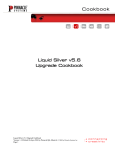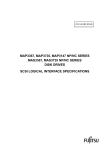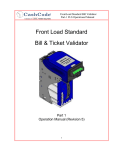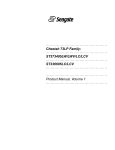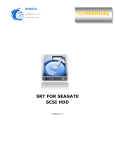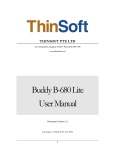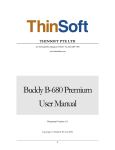Download HP Evo W8000 Specifications
Transcript
Liquid blue v5.6 Upgrade Cookbook Liquid blue v5.6 Upgrade Cookbook v. 1.0 Version 1.02 Compiled 29-Mar-2004 by Pinnacle QA, Munich; © 2004 by Pinnacle Systems Inc Page 1 TABLE OF CONTENTS CAVEAT UPGRADER................................................................. 3 INTRODUCTION ....................................................................... 3 RELATED DOCUMENTS............................................................. 3 SYSTEM CONSIDERATIONS....................................................... 4 How Much RAM is Necessary? ............................................................................................................ 4 Operating System .............................................................................................................................................. 4 TSRs................................................................................................................................................................................ 4 Bus Mastering ....................................................................................................................................................... 4 File System................................................................................................................................................................ 4 UPGRADING HP XW6000 TO WINDOWS XP ................................. 5 Update Your System BIOS ....................................................................................................................... 5 Update OS with Restore CD ................................................................................................................... 5 Install the Liquid blue v5.60 Software............................................................................................ 6 UPGRADING COMPAQ EVO W8000 TO WINDOWS XP.................... 8 Update Your System BIOS ....................................................................................................................... 8 Install OS with Retail CD.............................................................................................................................. 8 Install the Liquid blue v5.60 Software............................................................................................ 9 UPGRADING LEGACY TURNKEY SYSTEMS TO LIQUID BLUE 5.60 . 12 System Check ...................................................................................................................................................... 12 Install the Liquid blue v5.60 Software.......................................................................................... 12 APPENDIX A – BACKING UP AND ARCHIVING PROJECTS .............. 15 PROCEDURE......................................................................................................................................................... 15 BACKING UP PROJECTS......................................................................................................................... 16 CGS, GRAPHIC AND SOUND FILES............................................................................................ 16 RESTORING PROJECTS............................................................................................................................ 16 Project.project file............................................................................................................................................ 17 ARCHIVING FILES FOR AN OS UPGRADE............................................................................. 17 Liquid blue v5.6 Configuration Cookbook 3/29/2004 Page 2 Caveat Upgrader There are two categories of Liquid blue users who will need to follow separate upgrade instructions to prepare their systems for a Liquid blue v5.6 installation: 1. Customers using HP xw6000 or Compaq Evo W8000 have to upgrade to Windows XP Professional 2. Customers using legacy systems (3 height units chassis and 5 height units chassis with ASUS CUV4X-DLS main board) must not upgrade to Windows XP. These systems do not support Windows XP! Please read the general information related to Liquid blue workstations as well as the information specific to your system’s upgrade requirements. Introduction This document is designed to help a Liquid blue v4.6x customer upgrade to Liquid blue v5.60. The individual using this document must be technically capable of understanding and interpreting this information. Neither this document nor Pinnacle Systems Support is meant to educate the computing novice or casual integrator about the details needed to construct a reliable, high performance editing workstation. Experience has proved that a better use of time and money is to rely on a Pinnacle Systems Authorized VAR (Value Added Reseller) to configure and support a fully integrated Liquid editing workstation. This is a working document, periodically updated as new information or knowledge is acquired. Regardless of the advice given here, Pinnacle Systems does not warrant or guarantee the functionality and performance of the systems or components recommended. IN NO EVENT SHALL PINNACLE SYSTEMS BE LIABLE FOR ANY INCIDENTAL, CONSEQUENTIAL OR SPECIAL DAMAGES, WHETHER BASED ON TORT, CONTRACT, OR OTHERWISE, ARISING OUT OF OR IN CONNECTION WITH THIS COOKBOOK, THE SOFTWARE OR OTHER INFORMATION CONTAINED HEREIN OR THE USE THEREOF. Related Documents Specifics of Liquid blue installation can be found in the Liquid blue reference guide that is included with the product. Please consult the Liquid blue support site to avoid common problems. For information on how to contact Pinnacle Systems, please see http://www.pinnaclesys.com/support/contact/default.asp?ContactID=15 Liquid blue v5.6 Configuration Cookbook 3/29/2004 Page 3 System Considerations How Much RAM is Necessary? Liquid blue requires a minimum 512 MB RAM. 1GB is recommended for demanding use of all features. Operating System Windows XP Professional SP1 (including DirectX 9.0a or 9.0b) is required for the following turnkeys: • HP XW6000 workstation • Compaq Evo W8000 workstation TSRs Software such as Scheduler, Task Reminder, Microsoft Outlook, Real Player and Screen Savers can interrupt a Liquid blue session causing drop frames and other performance problems. All TSRs should be disabled during an edit session. Bus Mastering Make sure that Bus Mastering is enabled in the BIOS for all PCI slots. This is a requirement. File System Liquid blue systems must be formatted as NTFS volumes. Liquid blue v5.6 Configuration Cookbook 3/29/2004 Page 4 Upgrading HP xw6000 to Windows XP There are 3 things you will need to do to upgrade your xw6000 to get Liquid blue v5.60 up and running: 1. Update your system BIOS to v. 1.17 2. Update OS using Pinnacle’s Windows XP Restore CD for HP xw6000 3. Install Liquid blue v5.60 Update Your System BIOS If your system is not running the certified xw6000 BIOS version 1.17, please upgrade your BIOS. You can download the BIOS from the HP support site: http://h20000.www2.hp.com/bizsupport/TechSupport/DriverDownload.jsp?pnameOID=295781&locale =en_US&taskId=135&prodSeriesId=295779&prodTypeId=12454&swEnvOID=1093#1921 After downloading the BIOS, please follow these instructions closely and carefully: Step 1. - Run the downloaded self-extracting archive and extract all files to a local folder on the machine that needs to be updated Step 2. - Flash the BIOS 1. Open the folder containing the extracted files from step 1 2. Open the subfolder \HPQFlash and run HPQFlash.exe 3. Make sure "Version of BIOS in ROM update" shows the correct version (68604 v.1.17) 4. Run the BIOS update 5. Power down your system 6. Restart the system and enter the BIOS by pressing <F10>. 7. Adjust BIOS settings according the system summary provided below. Update OS with Restore CD As an existing Liquid blue customer, you can order a Liquid OS Restore CD and it will be shipped to you free of charge. To order your Restore CD, click on the link below and follow the instructions in the document: http://www.pinnaclesys.com/SupportFiles/XP_Restore_Request.pdf Once you have received your Restore CD. Please follow these steps: 1. Backup all your projects, titles, user data or other non-system files that you may wish to save to a different machine, DVD or some external archival device (see Appendix A). 2. Ensure that the DVD drive is the first boot device on the system (this should be the default setting). To change the setting in the BIOS: Press F2 on the system startup to enter the BIOS and adjust the boot order. 3. Insert the restore DVD into the DVD drive and restart the system. 4. Follow the instructions on the screen. Note that the system restore will destroy all data on the drive, so make sure you have backed up your data as mentioned in step 1. 5. At the end of the restore process, remove the DVD from the drive and reboot the computer with CTRL-ALT-DEL. The system should restart with Windows XP SP1. Liquid blue v5.6 Configuration Cookbook 3/29/2004 Page 5 6. You will see the windows desktop. If your blue hardware is installed, a number of dialog boxes will appear asking if you want to install drivers. Click Cancel for each of these. If your system has a connection to the Internet, you may want to download the most recent Microsoft system and security downloads. Only install system and security updates recommended by Microsoft. This may include DirectX 9.0b, which is certified for use with Liquid blue v5.60. Install the Liquid blue v5.60 Software 1. Install the Liquid blue v5.60 software per the installation instructions, then Commotion and Impression. 2. Reinstall all your projects, user data and non-system files that you have backed up. Your system is now ready for use again. (For tips on backup see Appendix A – Back Up and Archiving Your Projects). Liquid blue v5.6 Configuration Cookbook 3/29/2004 Page 6 SYSTEM SUMMARY HP XW6000 Main Board: HP system board rev. 0F BIOS: RAM: CPU: HP System ROM v. 1.17 1024 MB PC2100 ECC DDR 266 Dual Intel Xeon CPU 2.66 GHz or 2.8 GHz SCSI: Adaptec AIC-7902 Ultra320 Dual Adapter driver V1.2.0.0 BIOS build 40030 VGA: Matrox G450 or G550, Graphics Bios 1.0 b09, Power Desk 6.86.027, driver: 5.86.32.0 Audio: on board SoundMAX (AC`97) (not tested) LAN: onboard Broadcom NetXtreme Gigabit Ethernet driver: 6.34.0.0 System Drive: MAXTOR Atlas U320-36-WLS on channel A Video Drives: 2x Fujitsu MAP3147 NP (147 GB drives) on channel A (stripe set) CD Drive: Compaq CD-ROM SC 148E OS: Microsoft Windows XP Professional 5.1.2600 SP1 Build 2600 + all available online system and security updates* + DirectX 9.0a / 9.0b Pinnacle Liquid.blue 5.60 Software: Release Build 1490 SLOT ASSIGNMENT: AGP PCI Slot 1 PCI Slot 2 PCI Slot 3 PCI Slot 4 Matrox G550 for options use (32bit) blue InTime (32bit) blue InTime (32bit) blue Codec (32bit) CONFIGURATION NOTES: BIOS: • • “Advanced / Bus Options / PCI SERR# Generation” switch to “Disable”. “Advanced / Device Options / HyperThreading” switch to “Enable” *) system and security only, not Media Player and other application-related updates! Liquid blue v5.6 Configuration Cookbook 3/29/2004 Page 7 XW 6000 Mini Tower FEATURES AND SPECIFICATIONS: http://www.hp.com/workstations/ia32/xw6000/index.html Power Supply Power Supply 460-Watt, with Power Factor Correction Processor Support Supports up to two Intel Xeon processors, 2.4-GHz, 2.66-GHz, 2.8-GHz, and 3.06-GHz, 533MHz front side bus Chipset Intel E7505 chipset with 533-MHz front side bus and dual memory channels Front Side Bus 533MHz front side bus Memory ~ 8 GB of DDR266-MHz ECC PC2100 Registered I/O Expansion • Expansion Slots I/O (Total) 5 total slots/4 available • PCI - 32-bit/33-MHz 4 slots,4 available • AGP Pro50, 8X 1 slot occupied by choice of graphics card Onboard Devices • • • • • • • • • • • • • • • Interfaces Parallel 1 25-pin port, rear USB 2.0 4 (2 front, 2 rear) IEEE Firewire Optional – 3 (1 front, 2 rear) Serial Two 9-pin connectors (rear) Ultra320 SCSI Two 68-pin connectors (1 rear, 1 internal) Ultra ATA/100 2 connectors, primary and secondary (internal) Keyboard 1 PS/2 keyboard port (rear) Pointing Device 1 PS/2 mouse port (rear) Video Choice of professional graphics options Audio AC97/16-bit stereo full-duplex Network interface 1 RJ-45 connector (rear) Broadcom NexExtreme 10/100/1000-Gb Microphone Jack 1 (front) Headphone Jack 1 (front) Line-In Jack 1 (rear) Line-Out Jack 1 (rear) Upgrading Compaq Evo W8000 to Windows XP There are 3 things you will need to do to upgrade your xw6000 to get Liquid blue v5.60 up and running: 1. Update your system BIOS to v. 1.27 2. Update OS using a retail Windows XP Professional CD 3. Install Liquid blue v5.60 Update Your System BIOS If your system is not running the certified BIOS version 1.27, please upgrade your BIOS. You can download the BIOS from the HP support site: http://h18007.www1.hp.com/support/files/evoworkstation/us/locate/20_1332.html#0 Step 1. - Download the ROMPaq file. This SoftPaq creates a ROMPaq firmware diskette that can be used to locally restore or upgrade the System ROM in the Compaq Evo Workstation W8000 models. Execute the file and unpack all files to a local directory. Follow the on-screen instructions to build a bootable diskette for the upgrade process. Step 2. - Flash the BIOS 1. Insert the diskette and reboot your system 2. Follow the on-screen instructions to upgrade the BIOS 3. Power down and restart your system 4. Modify BIOS settings to match the one in the system summary provided below. Install OS with Retail CD If you do not have a Microsoft Windows XP Professional license and installation CD, you must purchase one. Once you have received your Installation CD. Please follow these steps: 1. Backup all your projects, titles, user data or other non-system files that you may wish to save to a different machine, DVD or some external archival device (see Appendix A). 2. Install Windows XP SP1 following the installation instructions given by Microsoft. Either reformat the partition containing your previous OS version and install Windows XP from scratch or install on the same partition, but in a different directory. Alternatively you can install Windows XP on a different drive or partition. This will create a boot manager that enables you to select the OS at the beginning of the boot process. In any case, DO NOT perform an upgrade installation of your current Windows 2000 installation! 3. Start the system. You will see the windows desktop. If your blue hardware is installed, a number of dialog boxes will appear asking if you want to install drivers. Click Cancel for each of these. 4. Configure and optimize the system following the installation procedure in the system summary (see below, steps 3 to 7). If your system has a connection to the Internet, you may want to download the most recent Microsoft system and security downloads. Only install system and security updates recommended by Microsoft. This may include DirectX 9.0b, which is certified for use with Liquid blue v5.60. Liquid blue v5.6 Configuration Cookbook 3/29/2004 Page 8 Install the Liquid blue v5.60 Software 1. Install the Liquid blue v5.60 software per the installation instructions (see below, step 14 to 16), then Commotion and Impression. 2. Reinstall all your projects, user data and non-system files that you have backed up. Your system is now ready for use again. (For tips on backup see Appendix A – Back Up and Archiving Your Projects). Liquid blue v5.6 Configuration Cookbook 3/29/2004 Page 9 SYSTEM SUMMARY COMPAQ EVO W8000 BIOS: Compaq System-BIOS v. 1.27 RAM: 512 MB PC800 RDRAM (min.), ECC (1024 MB recommended) CPU: Single or dual Intel Xeon CPU 2 or 2.2 GHz (single 2 GHz is standard) SCSI: ADAPTEC AIC-7899 Ultra160 Dual, standard W2K driver, BIOS Rev.: 2.55.2 VGA: Matrox G 450 AGP DH Driver Package 5.86.032 (WHQL certified); Kernel driver 5.12.01.1860, Power desk 6.86.027 (Graphics BIOS 2.0 B36) Audio: RME DIGI96/8 PAD Broadcast, driver 2.023 onboard Intel PRO/100+ LAN: System drive: Compaq PC ST31451LW Ultra3-SCSI (Ch. A) 18GB Video drives: 4 x Seagate Cheetah ST373405LW Ultra3-SCSI as software stripe set (Ch. A) SW (dealer option only; see below) FEATURES AND SPECIFICATIONS: http://www.compaq.de/produkte/workstation/evo/w8000/index.htm Power Supply 500-Watt, with Power Factor Correction (PFC) CD Drive Compaq DVD-ROM GDR 8160 B or Compaq CD-RW drive OS: Microsoft Windows XP Professional 5.1.2600 SP1 Build 2600 + all available online system and security updates* + DirectX 9.0a / 9.0b Chipset Intel 860 Liquid.blue 5.60 Release Build 1490 I/O Expansion I/O (Total) 64-bit/66-MHz PCI 32-bit/33-MHz PCI AGP Pro 4X Pinnacle Software: SLOT ASSIGNMENT (Standard): AGP PCI Slot 1 PCI Slot 2 PCI Slot 3 PCI Slot 4 PCI Slot 5 PCI Slot 6 MATROX G450 DH blue.InTime blue.Codec RME DIGI96/8 PAD blue.InTime (used for options) (used for options) (32bit) (32bit) (32bit) (32bit) (64bit) (64bit) SLOT ASSIGNMENT (Alternate): PCI Slot 1 blue.InTime (32bit) PCI Slot 2 blue.Codec (32bit) PCI Slot 3 ATTO ExpressPCI-FC 3300 (32bit) PCI Slot 4 blue.InTime (32bit) PCI Slot 5 RME DIGI96/8 PAD (64bit) PCI Slot 6 Intel Pro/1000XT Server (64bit) Liquid blue v5.6 Configuration Cookbook 3/29/2004 Page 10 Processor Support Intel Xeon 2,2 GHz Front Side Bus 400 MHz Memory 4 GB of 800-MHz ECC RDRAM 7, up to 6 available 2, 2 available 4, up to 4 available depending on model 1, up to 1 available depending on model Onboard Devices Ultra ATA 100 Adaptec AIC 7899 Ultra 160 SCSI / Dual ATAPI Integrated Intel PRO/100+ Management Adapter Up to Four USB (Universal Serial Bus) ports PS/2 keyboard and PS/2 mouse connectors Two fast UART 16550 compatible serial ports One ECP/EPP parallel port One Infrared header One floppy port Chassis Compatibility Rack Mountable (5U) cv 8.05 x 17.7 x 20.5 in/20.5 x 54.6 x 45 cm CONFIGURATION NOTES: BIOS: “Advanced\ Bus Options\ PCI SERR# Generation” switch to “Disable”. More details: see section «Installation Procedure». INSTALLATION PROCEDURE for Liquid blue 5.60 Turnkey System: – Set “Screen Refresh Rate” under “Monitor” to 75 Hertz and click OK – Under tab “Troubleshooting” set “Hardware Accelaration” slider one step back to one below maximum 6. Reboot computer 1. VGA Card As the VGA card is not pre-installed from Compaq’s side, it has to be installed to the AGP slot by the integration factory. 7. BIOS Version Check BIOS version, if necessary update to version 1.27 (download BIOS from http://www.compaq.com/support/files/evoworkstation/us/l ocate/20_1332.html and follow the instructions provided there) 2. 8. Install the operating system: a) Windows 2000 Installation (Recovery CD) Power up the computer and follow the on-screen instructions until Windows 2000/SP2 or 3 is installed. Note that many system drivers are not updated automatically (this has to be done in Device Manager using the “Update Driver” button)! b) Windows XP Professional Upgrade Installation (Retail CD) Follow Microsoft’s directions to install your copy of Windows XP Professional SP1. 3. Windows Optimization Download and install TweakUI.exe (version 1.33) from Microsoft’s homepage (http://www.microsoft.com/ntworkstation/downloads/Po werToys/Networking/NTTweakUI.asp ). After installation, open the TweakUI applet in Windows Control Panel and do the following modifications: - Tab “Mouse”: set “Menu Speed” to “Fast” - Tab “General”: deactivate / uncheck all 4. VGA Driver Installation – After the installation is complete and you re-boot the machine – Insert the Matrox Driver CD when prompted to install the VGA drivers. – Follow the onscreen instructions to add / update drivers for Plug&Play components. 5. DualHead Setup, Screen Refresh Rate. Resolution and Hardware Acceleration – Open the Matrox Quickdesk application (from quick launch area of Windows Task Bar), click on “Settings”, then “Advanced” – Click on tab “Options”; under section “Performance” set “Use busmastering” to “off” – Go to “DualHead” – “Features” - “DualHead MultiDisplay”; change settings”Use DualHead Multi-Display” and “Same resolution and color palette for both displays” – Set “Secondary Monitor Limits” under “Advanced Settings” to 1024 x 768 @ 75Hz – Go to “Properties”-Tab and set resolution to 2048x768 Liquid blue v5.6 Configuration Cookbook 3/29/2004 Page 11 Shutdown computer 9. RME Soundcard Installation – Insert RME soundcard into slot PCI3 – Power up computer and follow On-Screen instructions to install drivers. Insert RME driver disk with driver v. 2.023 when prompted. – After the installation press “OK” to reboot computer – Play wave file to ensure audio works correctly – Insert a floppy disk into drive A:, open Explorer and check if floppy drive works. (If RME or floppy drive fail in the test follow instructions in section “Configuration Notes” above and repeat previous steps) 10. Internal Storage (optional) – Connect 4 video drives (see section “Configuration Options”) to Channel A (together with system drive) – power up computer – go to Windows Computer Management / Disk Management, create and format stripe set – assign “R:” as drive letter 11. Shutdown computer 12. blue. Hardware Installation – Install blue. hardware as specified in section “Slot Assignment” of the cookbook – Connect dongle to printer port 13. Power up computer and cancel all “New Hardware found” messages that appear during system start (many!) 14. blue. Software Installation Insert blue.FASTstudio installation CD and install blue software 15. Shutdown computer; switch it off and wait 20 seconds! 16. Install liquid.blue again to make sure all options are activated correctly (as the drivers are installed in step 13, they are active only after reboot; to make sure e. g. the IMX option is activated, liquid.blue has to be installed a second time!) Upgrading Legacy Turnkey Systems to Liquid blue 5.60 If you have a legacy turnkey workstation, you cannot perform a Windows XP upgrade. Blue turnkeys 1 and 2 (3 / 5 height units 19” chassis, ASUS CUV4X-DLS main board) are not supported under Windows XP. You can keep your current Windows 2000 Professional installation, but you should install all available and recommended system and security updates from the Microsoft web site. This may include DirectX 9.0b, which is certified for use with Liquid blue v5.60. System Check Before proceeding with the Liquid blue software upgrade, please check if all driver versions and settings comply with the system summary below. Install the Liquid blue v5.60 Software We recommend installing Liquid blue 5.60 in the same directory as Liquid Blue 4.6x. Do not uninstall the previous version of Liquid blue! Using this method you can keep all your user data and personal settings. However, it is highly recommended to create backup copies of your projects before migrating them to v. 5.60. See Appendix A for further instructions. Liquid blue v5.6 Configuration Cookbook 3/29/2004 Page 12 SYSTEM SUMMARY ASUS CUV4X-DLS BASED LEGACY TURNKEY SYSTEMS: Mainboard: ASUS CUV4X-DLS BIOS: Award BIOS, Asus Rev. 1014 Chipset: VIA 694XDP (VIA VT82C694XDP North Bridge and VIA VT82C686B South Bridge) RAM: 512 MB RAM SDRAM Infineon DIMM ECC unbuffered (1024 MB recommended) CPU: Dual CPU support up to ~1.1 GHz CPU (2x866 MHz tested) SCSI: Onboard Symbios Logic Dual channel controller Ultra3 53C1010-33 (Version PCI4.18.032), Driver 5.9.0.0 VGA: Matrox G 450 AGP DH Driver Package 5.86.032 (WHQL certified); Kernel driver 5.12.01.1860, Power desk 6.86.027 (Graphics BIOS 2.0 B36) FEATURES AND SPECIFICATIONS: http://www.asus.com/mb/socket370/cuv4x-dls/overview.htm • Dual FC-PGA Intel Pentium 450 to 933+MHz Coppermine™ Processors • Chipset: VIA 694XDP and VIA 686B LAN: onboard LAN Adapter Intel Pro/100+ Managment Adapter (driver version 4.1.67.0) • Dual Channel Ultra160 SCSI Controller with 2 wide SCSI connectors Audio: RME Digi96/8 PAD, driver version 2.023 or Soundblaster 128 PCI • 4 DIMM socket support 32MB to 2GB ECC/nonECC 3.3V SDRAM System drive: IBM 18 GB DDYS18350M Ultra3-SCSI • Dual channel Bus Master IDE ports supports UltraDMA/100 and up to 4 IDE devices Video drives: 4x IBM 36 GB DDYS 36950N Ultra3-SCSI in 2 internal, cooled drive cases as stripe set (RAID 0) • 5 PCI slots, 2 USB ports, 2 Serial and 1 Parallel ports OS: Pinnacle Software: Microsoft Windows 2000 Professional Version 5.0 2195 + SP 4 and all available online system and security updates* + DirectX 9.0a / 9.0b Liquid.blue 5.60 Release Build 1490 SLOT ASSIGNMENT: AGP PCI Slot 1 PCI Slot 2 PCI Slot 3 PCI Slot 4 PCI Slot 5 MATROX G450 DH (optional Gigabit Ethernet or Adaptec 39160) blue. InTime RME DIGI96/8 PAD blue.Codec blue.InTime Liquid blue v5.6 Configuration Cookbook 3/29/2004 Page 13 • • • Intel 82559 Fast Ethernet controller AGP Pro Advanced Graphics Slot for 3D graphics AC97 AD1881A Audio Codec • ATX Wake-UP on LAN, Wakeup on Ring, chassis intrusion detection • System Auto Speed Down for CPU Overheat PC Health Monitoring? • Bundled ASUS PC Probe™ Utility - 2Mb EEPROM and Award BIOS with -Enhanced ACPI, DMI, Green, PnP Features Plus, Trend Chip Away Virus™(TCAV) (Detailed feature list: see above HTTP link) CONFIGURATION NOTES: 5. Windows 2000 / VIA Drivers 1. Hardware Setup Note that many system drivers are not updated automatically (this has to be done in Device Manager using the “Update Driver” button)! VIA device drivers should be updated manually to the latest version available on the system after installing Service Pack 2 for Windows 2000. VIA device drivers should then have the following versions: • • • Disable onboard AC97 audio chip (jumper) Enable onboard LAN (jumper) If optional Gigabit Ethernet card or Adaptec AHA39160 SCSI controller shall be used, it must be placed in PCI slot 1. 2. BIOS • Update to rev. 1014 (check ASUS website for detailed instructions) • BIOS Settings: - ADVANCED Menu: - ONB Primary SCSI Term = ENABLED (attaching external devices to the onboard controller is not recommended!) - ONB Secondary SCSI Term = ENABLED (attaching external devices to the onboard controller is not recommended!) - Parallel Port Mode = EPP - Primary VGA BIOS=AGP card - BIOS Update = Enabled - Power Management Menu: Power Management = DISABLED - BOOT Menu: Plug & Play OS = YES (this MUST be set to “No” if RME soundcard is installed!) 3. Onboard SCSI Controller Maximum Data Transfer Speed should be set to 80 MB/sec. for each hard drive in the SCSI controller’s BIOS. 4. RME Sound Card • • • English Windows: VIA IDE Busmaster Controller VIA Tech CPU to AGP Controller VIA Tech CPU to PCI Brdige VIA Tech CPU to ISA Brdige VIA Tech Power Management Controller 5.0.2195.2959 5.0.2195.2959 5.0.2195.2959 5.0.2195.2959 5.0.2195.2959 German Windows: VIA IDE Busmaster Controller VIA Tech CPU to AGP Controller VIA Tech CPU to PCI Brdige VIA Tech CPU to ISA Brdige VIA Tech Power Management Controller 5.0.2195.2908 5.0.2195.2908 5.0.2195.2908 5.0.2195.2908 5.0.2195.2908 CONFIGURATION OPTIONS: 1. Hard Drives For video data, the above mentioned 36 GB hard RME sound card must be installed in PCI slot #3. drives can be replaced by the following hard Driver version should be 2.023 drives: BIOS / Boot menu: Plug & Play OS must be set to - IBM 73 GB (type IC35L073UWD210) or “No” - Seagate Cheetah 73 GB (Type ST373405LW) 5. Adaptec SCSI Controller Important: these drives must be used internally (2 on ADAPTEC 39160 Dual-SCSI controller is approved for channel A together with the system drive, 2 on channel B) and configured as stripe set (RAID level 0). use with external RAIDs. BIOS should have rev. Especially the Seagate drives MAY NOT be configured 3.10.0. Use Windows standard driver (5.0.2183.1). Important: If using an external RAID, SCSI specifications and Adaptec recommendations must be followed under any circumstances! Only then flawless operation is ensured. Liquid blue v5.6 Configuration Cookbook 3/29/2004 Page 14 as 2 stripe sets with 2 drives each. 2. Intel Gigabit Ethernet Controller The following Gigabit Ethernet controller is approved for use in this turnkey system: - Intel Pro/1000 (T = copper version; XF = optical version) The card must be placed in PCI slot #1. Driver version 3.1. APPENDIX A – Backing Up and Archiving Projects What happens when you create a project in blue? PROCEDURE 1. Create a project in Liquid blue called ‘orange’. 2. A folder gets created on the system drive: C:\program files\Liquid blue\projects\orange 3. This folder is the project and will be the location for all files connected to that project except the media, CGs and any imported graphics or sound. 4. A file gets created in the C:\program files\Liquid blue\projects\orange folder called orange.project. This file is 0kb. It has a blue icon. This is the file that is seen when browsing for projects in the blue GUI (If this file is missing for any reason it can be recreated by creating a new text file and saving it with the project name and a file extension of .project) 5. On the A/V drive the following folder is created for rendered material: R:\render\orange 913e03bb\ 6. This 8 digit alpha numeric number is created by blue for its own purposes. Do not change it. 7. No other folders are created until something is digitized into the project. Once this occurs the following folder is created on the A/V drive: R:\orange 913e03bb\ (This folder contains the index file, .M2V and .WAV files for each digitized clip.) It is important to note that the folder and clip names in blue are set up by blue software. If you change the name of the folders the system will no longer either ‘see’ that project or the media. The location of a clip’s media can be found by right clicking on the clip and selecting properties. The ‘properties’ window that appears contains the name of the file and its location. This can be very helpful for finding the whereabouts of graphics or CG files. Please also note, if you do change the location of the media, you can remap the Media Manager to locate the original media. To make sure Liquid is looking in the correct media directory, you must map the Liquid Media Management one directory level above the "reels" folder, typically FSmediaAV. The media’s path is based on the mapped directory, project, reel and timecode and not on the mapped drive letter. When backing up a project you must consider if you just want to backup the project folder or the back up the project folder and the media. Obviously if you are intending to back up the media you will need a back up device that can handle that volume of data. Note: it is not absolutely necessary to back up the render folder since this media will re-render itself when the project is restored. 8. Location of CGs, graphic and sound files. These files are not normally located in the same place as the digitized media. 9. Live input material – live input material has to be treated differently to player/recorder material since it cannot be batch digitized again. Liquid blue v5.6 Configuration Cookbook 3/29/2004 Page 15 BACKING UP PROJECTS There are two ways to back up the project folder. 1. Liquid blue has a project backup function in the start menu’s ‘projects’ menu (“save a copy…”). This function creates a copy of the current project to whatever destination you specify. No digitized material or CGs or imported material is backed up. 2. The second method for backing up is to simply use Windows explorer to copy the project folder to whatever destination you specify. The first method is probably the most convenient the main point is that the Liquid blue software will copy the project folder and the .project file. If you use the second method you must remember to copy the .project file as well. If you want to backup the project to a CD or DVD, we recommend copying it to a temporary directory in the first place. Then, compress the entire content of this directory (using WinZIP, WinRAR or the compression tool of your choice) and burn only the single compressed archive file to the CD or DVD medium. This leaves the file attributes unaltered (see below, “Restoring Projects”). CGS, GRAPHIC AND SOUND FILES. The location of CGs created in a project and imported graphics are always different to the location of the Liquid blue projects. So CGs and imported graphics have to be backed up separately for a project. Default location for Titles: 1. C:\program files\Liquid blue\titles\ Imported graphics files can be located almost anywhere (defined in the “Titler” control panel) – typically they should be located on the A/V drive. Again, when backing up these folders make a note of where they came from so that they can be restored to the same place. RESTORING PROJECTS File location The main point to remember in restoring files from the back up device is to locate them in exactly the same place as they came from. The reason for this is that clips within Liquid blue expect to find their associated media in the location they were originally placed in. If they cannot be found in that location then the clip will display a ‘!’. Removing file attributes Liquid blue expects all file and sub-folders of the project folder to have no file attributes. This way it can read and write files freely during normal operation. However, when backing up a project to a CD-R(W), DVD-R(W) or +R(W), the attributes of some or all files and sub-folders are changed to ‘read only’. This attribute must be removed before the project can be used within the Liquid application software. This does not apply if you compressed the project data (see above, “Backing up Projects”). Typically when a project is restored from a CD it will not have the usual gray folder icon attached to it. It will look like a regular folder. This is because all the files within that project folder have become ‘read only’. To rectify this situation all the file and subfolder attributes will have to be removed. Using Windows explorer, drill down into all the folders, select all files and remove the ‘read only’ and/or Liquid blue v5.6 Configuration Cookbook 3/29/2004 Page 16 ‘archive’ attribute from them. Once all the files and folders have had their attributes removed Liquid blue will be able to operate on that project. Project.project file If the .project file is not located in the same folder as the project Liquid blue will not be able to ‘see’ that project. This file can be recreated by creating a new text file and saving it with the project name and a file extension of .project. ARCHIVING FILES FOR AN OS UPGRADE If you want to archive all of your Liquid blue files for the purpose of upgrading your system, we recommend the following process: 1. Backup Project 2. Backup Titles 3. Backup Media 4. Backup Render Files Perform upgrade procedure(s). Then restore all of the Liquid-related files to their original locations with careful attention to make sure the files paths are as they were before the upgrade. 1. Restore Render Files 2. Restore Media 3. Restore Titles 4. Restore Projects Please note that if after starting Liquid again, imported clips are still not properly linked (media marked as offline or showing “!”), you can re-link imported clips to the media. In the rack with the missing media, select “Verify Media” and “Link” as your Media Action. If Liquid cannot find the media automatically, it will prompt you to point to it. If logged clips are still offline, please check if the directory containing them is properly mapped in the Media Management settings. The mapped path must always point to the directory one level above the “reels” folder (e. g. “r:\FSMediaAV” if the clips are located in “r:\FSMediaAV\reels\…”). Liquid blue v5.6 Configuration Cookbook 3/29/2004 Page 17

















